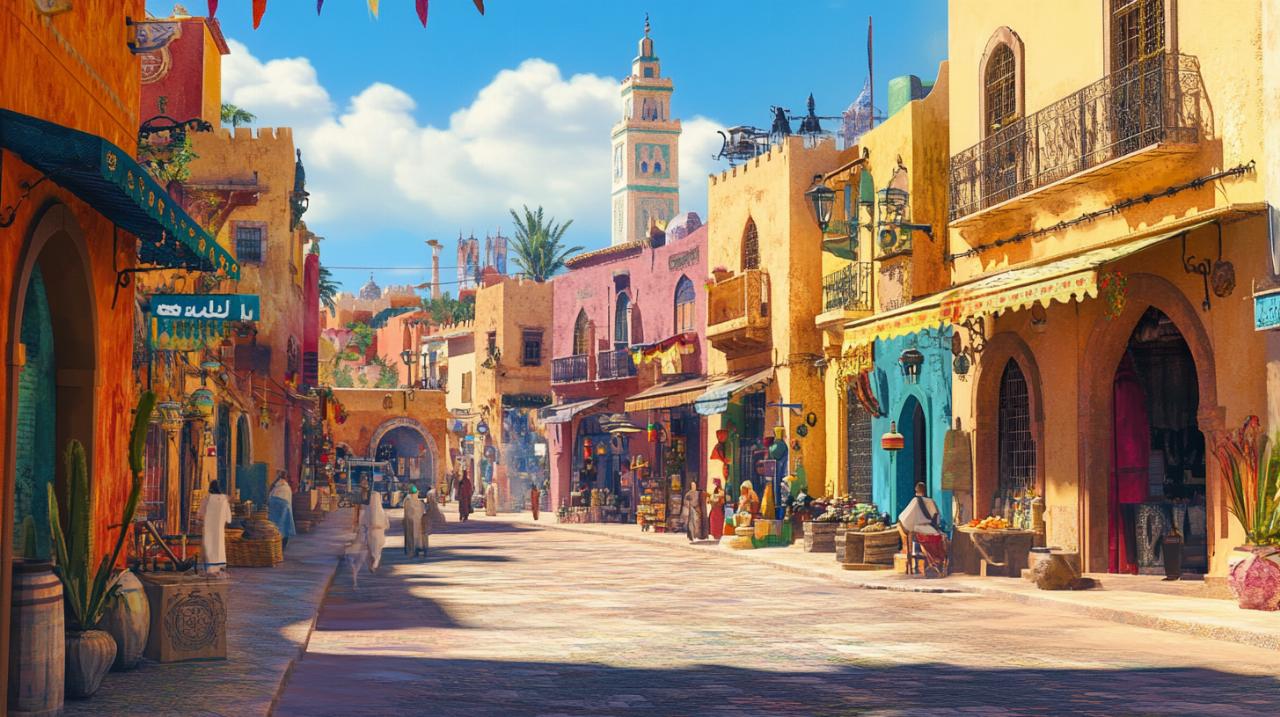Relocating to Morocco presents a unique set of challenges for French expatriates, particularly when it comes to securing suitable accommodation. The Moroccan property market operates differently from what many French nationals might be accustomed to, requiring careful navigation and local knowledge to ensure a smooth transition. Understanding the intricacies of rental agreements, legal frameworks, and regional price variations can significantly impact your experience when settling in this North African nation.
Navigating the moroccan rental landscape
The property rental process in Morocco can be somewhat opaque for newcomers, with regulations that exist on paper but aren't consistently enforced. This creates a situation where French expats often find themselves grappling with uncertainty when attempting to secure housing. The rental market operates with considerable flexibility, which can be both an advantage and a challenge depending on your perspective and preparation.
Understanding local property market dynamics
Morocco property rental practices differ significantly from those in France. Landlords maintain considerable leverage in the relationship, with the ability to legally request cash payments and advance rent. Additionally, many property owners impose restrictions on how tenants may use the space, sometimes even requiring permission for adding furniture. Perhaps most surprising to French expatriates is the common practice of landlords requiring tenants to purchase utilities directly from them rather than from service providers, creating an unusual middleman arrangement that doesn't exist in most European countries.
Popular cities and their unique rental markets
Casablanca stands as the primary destination for many French expats due to its vibrant cultural scene and abundant professional opportunities. The city offers a wide range of expatriate housing options, from modern furnished apartments in upscale neighbourhoods to more traditional accommodations. Marrakech rentals attract those seeking a more authentic Moroccan experience, while Rabat property tends to appeal to diplomatic and government-affiliated expatriates. Other cities such as Fes and Meknes offer distinct atmospheres and typically more affordable rental costs compared to the major metropolitan areas. Each location presents its own character and pricing structure, making research essential before committing to a particular region.
Financial considerations for french expats
Managing finances effectively is crucial when relocating to Morocco. The cost of renting represents a substantial portion of monthly expenses, and variations between cities can significantly impact your overall budget. Understanding the financial landscape helps ensure a sustainable living situation without unexpected surprises.
Budgeting for rental costs across different cities
Rental prices in Morocco vary dramatically depending on location, property size, and amenities. In Casablanca, a modern one-bedroom apartment in the desirable Riviera area might cost around 9,000 Dirham monthly, while a three-bedroom flat in Bouskoura commands approximately 14,000 Dirham. Moving to more exclusive areas or larger properties can push prices considerably higher, with some three-bedroom properties in premium locations reaching 22,000 Dirham per month. Villa rentals represent the upper tier of the market, with properties in areas like Californie in Casablanca or Sid El Abed in Harhoura commanding monthly rents of 35,000 Dirham for spacious family homes with multiple bedrooms. These figures highlight the importance of establishing a clear budget before beginning your property search.
Tax benefits that make morocco appealing
Beyond the immediate rental considerations, Morocco offers various tax advantages that make it financially attractive for French nationals considering relocation. These benefits can offset some of the costs associated with renting and help create a more favourable overall financial picture for expatriates. Many French expats find that these tax incentives, when combined with the generally lower cost of living compared to France, make Morocco an economically advantageous destination for both short and long-term residence.
Legal frameworks and tenant rights
While Morocco does have established rental laws, their inconsistent enforcement creates a somewhat ambiguous landscape for tenants. Understanding your legal position and rights is essential before signing any agreement, as practices may differ significantly from what you expect based on French standards.
Residence permits and regulatory requirements
French expats planning extended stays in Morocco need to address residence permit requirements as part of their relocation process. These permits are intimately connected to your housing situation, as you'll need to provide proof of accommodation to complete the application process. The regulatory framework surrounding property rental involves several bureaucratic steps that might seem unfamiliar to those accustomed to the French system. Working with experienced rental agencies or estate agents who specialise in expatriate housing can help navigate these requirements more efficiently.
Deposit protection and rental agreements
Tenant deposits are standard practice in Morocco, but unlike in France, the amount isn't clearly defined by law. This creates a situation where deposit amounts can vary widely and may be subject to negotiation. Similarly, rental contracts tend toward longer terms, with two-year agreements being common. These long-term contracts can provide stability but may also create complications for expats with uncertain timeframes. Understanding the terms for deposit return and the specific conditions of your rental agreement is crucial, as Moroccan law does provide tenant protection, but accessing these rights often requires knowledge of local procedures and sometimes professional assistance.
Top Rental Agencies for a Smooth Transition
 Securing professional assistance can dramatically improve your rental experience in Morocco. Several agencies specialise in helping expatriates navigate the unique challenges of the local property market, providing invaluable support throughout the process.
Securing professional assistance can dramatically improve your rental experience in Morocco. Several agencies specialise in helping expatriates navigate the unique challenges of the local property market, providing invaluable support throughout the process.
Trusted estate agents in major moroccan cities
Feel Home has established itself as a prominent real estate agency focused specifically on assisting expatriates with finding suitable rental properties. They operate primarily in Casablanca, Marrakech, and Rabat, offering move-in ready furnished apartments that cater to the needs of foreign nationals. Their services extend beyond simple property listings to include customised guidance and assistance with corporate leases, which constitute over 40% of their rental arrangements. For French expats in Casablanca, specialists like Christian Kari offer targeted expertise in navigating the local market. These professional estate agents understand the specific concerns and requirements of the expatriate community and can help bridge cultural and procedural gaps.
How to Assess and Choose the Right Property Partner
When selecting an agency to assist with your property search, consider their experience specifically with French expatriates and their understanding of the transitions involved. The most effective property partners offer comprehensive services that extend beyond simply showing available properties. Look for agencies that provide assistance with contract negotiations, utility setups, and ongoing support during your tenancy. Agencies with strong corporate connections often have access to higher quality properties and can leverage their relationships with landlords to secure more favourable terms. Evaluating an agency's reputation among the expatriate community and their portfolio of available properties in your desired locations will help ensure you find a trustworthy partner for this crucial aspect of your relocation.
Practical property search tips for french newcomers
Navigating the Moroccan property rental market can be a bit of a maze for French expats moving to the kingdom. With major cities like Casablanca, Marrakech, and Rabat offering varied living experiences and rental costs, understanding the local property landscape is essential for a smooth transition. The rental process often comes with its share of challenges – from unclear regulations to varying landlord requirements – making knowledgeable guidance invaluable for newcomers.
Specialist agencies such as Feel Home have emerged to serve the expatriate community, with operations across key cities including Casablanca, Marrakech, and Rabat. These firms focus on matching expats with suitable rental properties, whether apartments, villas, or office spaces, while providing crucial assistance with the nuances of Moroccan rental procedures. For French nationals unfamiliar with local practices, such services can significantly reduce the stress of relocation.
Choosing between furnished flats and villa rentals
When settling in Morocco, French expats face the fundamental choice between apartment living and villa rentals. Furnished apartments are particularly sought after, with Feel Home highlighting their 'move-in ready' options as ideal for expatriates seeking minimal hassle. The market offers diverse possibilities ranging from compact studios in Casablanca's Riviera area (56m² for 9,000 DH monthly) to spacious three-bedroom flats in Bouskoura (120m² commanding 22,000 DH per month).
For those requiring more space or privacy, villa rentals present attractive alternatives, albeit at premium rates. Notable examples include a 350m² property in Harhoura's Sid El Abed neighbourhood at 35,000 DH monthly, or a substantial 500m² residence in Casablanca's Californie district for the same price. The rental commitment typically involves long-term contracts spanning two years or more, making thorough property evaluation crucial before signing. Many French expatriates opt to rent rather than buy, gaining access to quality accommodation without the permanent commitment of property ownership.
Managing Utilities and Security Concerns in Your New Home
Setting up utilities in a Moroccan rental property can present unique challenges for French newcomers. Landlords might require tenants to purchase utilities directly from them rather than from service providers, a practice that warrants careful review during contract negotiations. The lack of standardised regulations means each rental situation may have distinct arrangements for water, electricity, and internet services.
Security ranks high among expatriate priorities when selecting rental properties in Morocco. Feel Home and similar agencies emphasise this aspect, screening properties based on safety considerations alongside location, size, and amenities. French expats should investigate neighbourhood security, building access controls, and property safeguards before finalising any rental agreement. The deposit system, while common practice, lacks legal standardisation regarding amounts and return conditions, making detailed documentation of property condition at move-in essential for protecting tenant interests. Many agencies now offer specific expat assistance services to navigate these matters, with Feel Home noting that over 40% of their rentals involve corporate leases – often preferred for their added layer of security and professional management.






